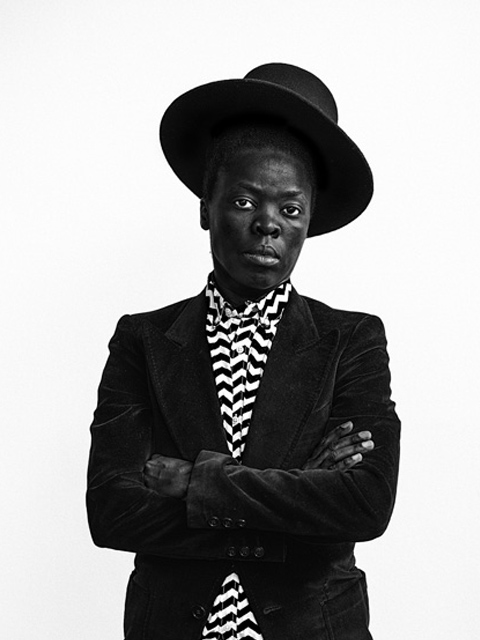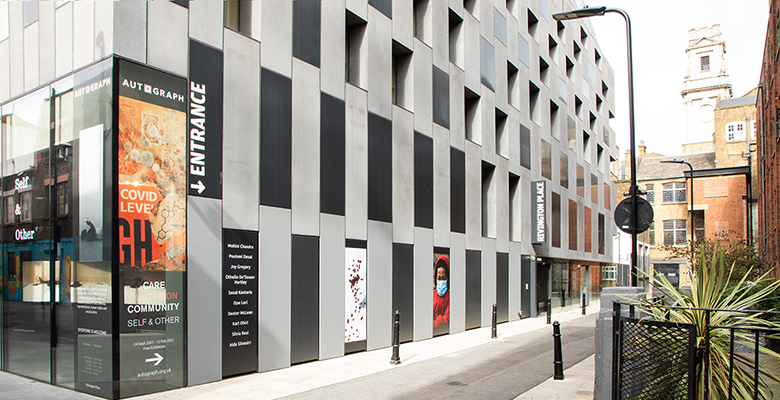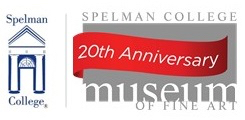In her first solo exhibition in London, South African visual activist Zanele Muholi (b 1972) presents her ongoing self-portrait series Somnyama Ngonyama.
In more than 60 photographs Muholi uses her body as a canvas to confront the politics of race and representation in the visual archive. Taken primarily in Europe, North America and Africa, each portrait asks critical questions about social justice, human rights and contested representations of the black body.
Muholi’s psychologically charged portraits are unapologetic in their directness as she explores different archetypes and personae, and offers personal reflections.
Everyday objects are transformed into dramatic and historically loaded props, merging the political with the aesthetic. Scouring pads and latex gloves address themes of domestic servitude, while alluding to sexual politics, violence and the suffocating prisms of gendered identity. Rubber tyres, safety pins and protective goggles invoke forms of social brutality and exploitation, often commenting on events in South Africa’s history; materials such as plastic draw attention to environmental issues and global waste. Accessories like cowrie shells and beaded fly whisks highlight Western fascinations with clichéd, exoticised representations of African cultures.
Somnyama Ngonyama playfully employs the conventions of classical painting, fashion photography and the familiar tropes of ethnographic imagery to rearticulate contemporary identity politics. By increasing the contrast in the dark complexion of her skin, Muholi interrogates complex representations of beauty and desire.
Gazing defiantly at the camera, Muholi challenges the viewer’s perceptions while firmly asserting her cultural identity on her own terms: black, female, queer, African.

Zanele Muholi was born in 1972 in Umlazi, Durban, and lives in Johannesburg, South Africa. Muholi sees their practice as visual activism to effect social change. Over the past decade, they have become known globally with Faces and Phases, a pioneering portrait photography of South Africa’s LBTQI communities.
Muholi co-founded the Forum of Empowerment of Women (FEW) in 2002, and founded Inkanyiso, in 2009 as a forum for queer visual activist media. Muholi studied Advanced Photography at the Market Photo Workshop in Newtown, Johannesburg, and holds an MFA in Documentary Media from Ryerson University, Toronto. They are an Honorary Professor at the University of the Arts Bremen, and has been the recipient of the prestigious Prince Claus Award and the Carnegie Fine Prize.
Muholi was included in the South African pavilion at the 55th Venice Biennale (2013) and took part in the São Paolo Biennial (2010) and documenta 13, Kassel (2013). Recent solo exhibitions include the Brooklyn Museum, New York (2015); Rencontres D’Arles (2016); and Stedelijk Museum, Amsterdam (2017).
Their photographs are represented in the collections of Centre Georges Pompidou, Paris; Guggenheim, New York; Museum of Contemporary Photography, Chicago; South African National Gallery, Cape Town; Walther Collection New York/Neu-Ulm; Tate Modern, London; and others. Muholi is represented by Stevenson Cape Town/Johannesburg and Yancey Richardson, New York.

Everyone is welcome at Autograph. We care about our visitors, staff, artists and community, and have measures in place to help ensure a safe visit for everyone. Have a look at our Visit Us page, it has full information about Covid-19 safety and accessibility at Autograph.
Can you spare a few moments? Autograph is carrying out a survey to better understand who our digital audiences are. The survey should take no longer than five minutes to complete. Anything you tell us will be kept confidential, is anonymous and will only be used for research purposes.
The information you provide will be held by Autograph and The Audience Agency, who are running the survey on our behalf. In compliance with GDPR, your data will be stored securely and will only be used for the purposes it was given.
You can take the survey here. Thank you!


Banner image: Zanele Muholi, Somnyama Ngonyama II, Oslo, 2015. © Zanele Muholi. Courtesy of Stevenson, Cape Town/Johannesburg and Yancey Richardson, New York.
Exhibition preview: 1) Zanele Muholi, Somnyama Ngonyama: Hail the Dark Lioness exhibition at Autograph, London. 24 July - 28 Oct 2017. Curated by Renée Mussai. 2) Zanele Muholi, Ntozakhe II, Parktown, 2016. © Zanele Muholi. Courtesy of Stevenson, Cape Town/Johannesburg and Yancey Richardson, New York. 3) Zanele Muholi, Julile I, Parktown, Johannesburg, 2016. © Zanele Muholi. Courtesy of Stevenson, Cape Town/Johannesburg and Yancey Richardson, New York. 4) Zanele Muholi, Somnyama Ngonyama II, Oslo, 2015. 5) Zanele Muholi, Kwanele, Parktown, 2016. © Zanele Muholi. Courtesy of Stevenson, Cape Town/Johannesburg and Yancey Richardson, New York.
Images on page: 6) Zanele Muholi, Muholi Muholi, Parktown, 2016. © Zanele Muholi. Courtesy of Stevenson, Cape Town/Johannesburg and Yancey Richardson, New York. 7) Autograph, photograph by Zoë Maxwell.
Autograph is a space to see things differently. Since 1988, we have championed photography that explores issues of race, identity, representation, human rights and social justice, sharing how photographs reflect lived experiences and shape our understanding of ourselves and others.